|
CELEBRATION OF VOCATIONS (LABOR DAY)
Sunday, September 2, 2012
Willie Dwayne Francois III, Guest Lectionary Commentator
Director of Christian Education, Wheeler Avenue Baptist Church, Houston, Texas, and Director of The African American Lectionary’s Young Ministers’ Corner
The unit you are viewing, Celebration of Vocations (Labor Day), is a compact unit. This means that it does not have a supporting cultural resource unit and worship unit. Instead, to enliven the imagination of preachers and teachers, we have provided scriptural text(s) that we suggest for this moment on the calendar along with a sermonic outline, suggested links, books, articles, songs, and videos. For additional information, see Celebration of Vocations (Labor Day) in the archives of the Lectionary for 2008–2011. 2012 is the second year that the African American Lectionary has featured compact units for moments on its liturgical calendar.
I. Description of the Liturgical Moment
A creation of the once narrow-sighted Labor Movement (which initially obscured the difficult working realities of black workers), and dedicated to economic and social justice, Labor Day originated as a local holiday in New York City on September 5, 1882. Remembering that blacks offered free labor under the dictates of chattel slavery for centuries, this initial observance of Labor Day occurred nearly 20 years following the Emancipation Proclamation.
As the movement sophisticated and gained momentum, black labor leaders persistently raised awareness of the gross inequalities related to black earning power and employability—the rights of the descendents of the persons who built this nation. At the dawn of American industrialization, the American economy gradually transitioned from agricultural dynamics, and mass numbers of Southerners migrated to northern cities in search of factory-based jobs.
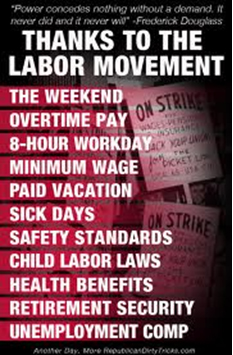 |
|
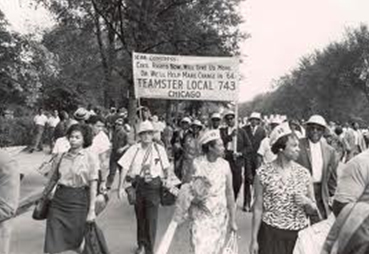 |
Celebrated the first Monday of September since 1894, Labor Day acknowledges and celebrates the efforts, temerity, and achievements of named and unnamed heroes of labor rights, economic equality, and the right to work. Since 1909, due to the efforts of the American Federation of Labor, the Sunday preceding Labor Day was designated Labor Sunday, memorializing the spiritual and educational dimensions of the Labor Movement. Labor Sunday offers the platform for churches to acknowledge the working class congregants and the countless persons committed to “leveling up” employment practices in America for women, blacks, and other minorities. We thank our God for working with and for us to help us gain advancements in labor relations and achievements in earning power.
II. Celebration of Vocations (Labor Day): Sermonic Outline
A. Sermonic Focus Text: Jeremiah 22:13-17 (New Revised Standard Version)
(v. 13) Woe to him who builds his house by unrighteousness, and his upper rooms by injustice; who makes his neighbors work for nothing, and does not give them their wages; (v. 14) who says, ‘I will build myself a spacious house with large upper rooms,’ and who cuts out windows for it, paneling it with cedar, and painting it with vermilion. (v. 15) Are you a king because you compete in cedar? Did not your father eat and drink and do justice and righteousness? Then it was well with him. (v. 16) He judged the cause of the poor and needy; then it was well. Is not this to know me? says the Lord. (v. 17) But your eyes and heart are only on your dishonest gain, for shedding innocent blood, and for practicing oppression and violence.
B. Possible Titles
i. Righteous Remuneration
ii. Slaves No More?
iii. Bad Bosses1
iv. Profits, Prophets, and Problems
C. Points of Exegetical Inquiry
It is critical to acknowledge that the judgment discourse of this text is pointed at the materialistic king of Judah, Jehoiakim. The meaning of this pericope hinges on the divine dictate and expectation of the royal personality to serve as the guarantor of justice and righteousness in the nation alongside Jehoiakim’s checkered narrative as a leader. His was a constant parade of royal aggrandizement, disregard for the personhood of others, and deviation from divine law.
Focusing on economic injustices, a few linguistic moves prove beneficial for interpreting this text. In verse 13, Abad, the Hebrew word for “to work” in this verse, signifies serving as a slave. Verse 15 asks, “Are you a king because you compete in cedar?” “Compete in” is translated from the word harah, which connotes anger. This connotes an aggressive attainment and materialism. Also, in verses 15c and 16b, the Hebrew word for well, tob, means holistic wellbeing and fruitfulness—economic, familial, sensual, and happiness.
III. Introduction
 |
|
Makeshift homes, unevenly cut signs bearing statements of discontent written with markers, the odorous scent familiar to a back alley, and human bodies are the characteristics that occupy the financial district in Boston, Massachusetts—Occupy Boston. These disenchanted American citizens used their bodies and lives to signal to plutocrats and oligarchs their rejection of the “profits over persons” practices of big business. As I walked through this concrete jungle in the middle of Boston last year, one sign jumped out |
more than the others. The only other black person at the occupy event, despite her fatigue and the sharp breeze, stubbornly held a sign: “SLAVES NO MORE?”
In that moment, most onlookers realized that occupy movement was a labor issue, a human rights issue. With CEOs making more than 100% more than the front-line workers of companies, this elderly lady intimated that the working conditions and wages in this country resemble the rigid, impersonal, and ungrateful conditions of a slave regime.
We are still slaves as we continue to place people on auction blocks and sacrifice personhood on the altars of capitalism. We have efforts purported to protect the public; instead they pad the pockets of the few. Our prison industrial complex is animated by economic and racial chauvinism. We fund a public education system perpetually leaving children behind based on zip codes and familial earning power.
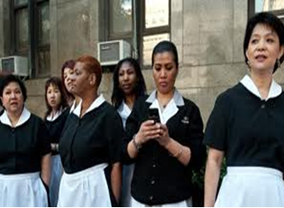 |
|
 |
Many work in cities in which they cannot afford to be residents, with clean hotels in which they cannot afford to lodge. Many work in hospitals in which their insurance plans cannot afford treatment, and they help produce vehicles, appliances, and products they cannot afford to purchase. In a word, precious people have been dragged to the auction blocks of big business. In financial districts across the nation, impassioned protesters are using their bodies to tell the comfortable, relaxed one percent of a new manifest destiny not built on the strained backs of the 99%. We have policies that merely protect the wealth of the wealthy. CEOs and corporations bulldoze their way to bountifulness on the backs of broke people.
IV. Moves/Points
Move/Point One – We produce with poor priorities.
a. Violation of standards: “Woe to him who builds his house by unrighteousness, and his upper rooms by injustice; who makes his neighbors work for nothing, and does not give them their wages” (v. 13); the remuneration practices of Jehoiakim compromised the levitical laws of compensation (Leviticus 19:13). The forced labor resembled the conditions and dictates of slavery, a memory etched in the history of the people of Israel.
b. Flawed agenda: God required the seated king to protect the weak and administer justice in the nation. This building project obscured the work of justice and righteousness for luxury, self-aggrandizement, and comfort. The prophet’s monologue confirms that Jehoiakim failed to fulfill the obligations of his appointment.
c. Inappropriate indicators of identity: “Are you a king because you compete in cedar?” (v. 15a). The king, Jehoiakim, based his identity as a king on what he could build and its material composition. The divine expectations of a king are enumerated in Psalm 72, Isaiah 9:7, and Isaiah 11:5.
Move/Point Two – Do not pervert your pedigree.
a. A misguided descendant: “Did not your father eat and drink and do justice and righteousness?” (v.15b). Jehoiakim deviated from his father’s example of service. Josiah, the venerable father of Jehoiakim, garnered a reputation of judicial competence and social compassion.
b. A materialistic impulse: “‘I will build myself a spacious house with large upper rooms,’ and who cuts out windows for it, paneling it with cedar, and painting it with vermilion.” (v.14). This verse demonstrates Jehoiakim’s materialism, because these building materials (the cedar and paint) were expensive materials imported from other areas of the Near Eastern world.
c. A misuse of power: “But your eyes and heart are only on your dishonest gain, for shedding innocent blood, and for practicing oppression and violence.” (v. 17).Unlike his father, Jehoiakim abuses power in the name of empire, at the expense of people.
Move/Point Three – Profit from prophetic practices.
a. God necessitates that we meet needs.
b. God identifies with the indigent: “‘Is this not to know me?’ says God.” (v. 16b). The word for know, da’at, means to know through senses or experience. In the tradition of Emmanuel Levinas, we know God, encounter the face of God in the face of the other. In the liberationist idiom, Yahweh identifies with the oppressed in our world. The story of Yahweh tells the story of God working on behalf of the oppressed children of Israel.
c. God compensates the compassionate: “He judged the cause of the poor and needy; then it was well” (v. 15). All was well with Josiah as he aligned with and participated in the plight of the oppressed in nation. Aforementioned, this signifies holistic well-being.
V. Challenge
The calamity of our existence and the sin of civilization is our reluctance to live together as “disciples of equals.” However, we are not left without hope. God speaks into these moments of disinheritance and demonstrates his commitment to the marginalized, overworked, and underpaid. In fact, we are able to meet God in the corruption and fight against it. Knowing God disallows us from ratifying and apathetically witnessing the abuse of God’s people. God requires that we abandon selfish ambitions that steadily build the foundation of our own guillotines. People are discarded and sacrificed on the altars of capitalism, empire, and militarism. We must challenge and push against the person-breaking realities in our world. The human person is more than dynamic dust waiting for death’s deadline; we are children of God, marked by his indwelling presence. Our right to dignity emanates from this reality.
VI. Illustration
The Service Elevator
Mohammed Yunus, a businessman from Bangladesh, was awarded the Noble Peace Prize in 2006. Yunus is convinced that the way to bring peace to the world is by eradicating poverty. So, Yunus makes loans to people who are in poverty. As a consequence of his conviction, he loans money to poor people so that they can operate their own businesses and escape poverty; he has served his way to the top.
A few years ago I was in an African hotel, and my room was on the top floor. The sister who was showing me how to get to my room said I had to use the service elevator because no other elevator was working. That’s what Muhammad Yunus has done. He has recognized that in this life if you want to reach the top, you have to take the service elevator. That’s what’s going to take you up. You don’t have to connive. You don’t have to scheme. You don’t have to stab anybody in the back. The way to reach the top is through the service elevator.
| |
—Frederick Douglas Haynes, III, Dallas, Texas |
This illustration was taken from the Sermon Illustration section of The African American Lectionary. Please visit this section for additional illustrations.
The Wrong Focus
In the 2004 Olympics in Athens, Matt Emmons was expected to take home the gold medal in rifle shooting. On that final Sunday of the Olympics, Brother Emmons was sitting pretty with only 8 points to go until he clinched victory. According to the interview, Emmons said, “As I stood at the line 50 meters away from the target, I was trying to remain calm, because I knew victory was so close.” As he shot that bow, trying to remain calm, the arrow landed on a bull’s-eye. He rejoiced knowing that a bull’s-eye just put him exponentially ahead of the other contenders. He stood at that shooting line awaiting the score change to register on the scoreboard. However, his score did not change, because he hit a bull’s-eye in the wrong lane. He had the right equipment, right energy, and the skill, but the wrong focus.
We cannot allow the media, pressure, or even our own concerns to compromise our focus on ensuring that the working poor receive a decent wage.
| |
—Willie Dwayne Francois III |
VII. Sounds, Sights, Colors, and Textures in This Passage
| Sounds: |
The voice of Jeremiah, the voice of Yahweh;
|
| Sights: |
Bleeding workers; people at work; lethargic bodies; a plethora of windows; a large palace;
|
| Colors: |
Red (paint); and
|
| Textures: |
Smooth cedar. |
VIII. Songs to Accompany This Sermon
A. Hymns(s)
- May the Work I’ve Done Speak for Me. By Sullivan Pugh. Arr. by K. Morris

- A Charge to Keep I Have. By Charles Wesley. African American spiritual
- I Don’t Feel Noways Tired. By James Cleveland

- Lead Me, Guide Me. By Doris M. Akers. Harm. by Richard Smallwood
B. Well-Known Song(s)
- I’m Available to You. By Milton Brunson

- Serving the Lord Will Pay Off after a While. Arr. by Jasper Williams Jr.
- Life Is Like a Mountain Railroad. By Charles A. Tindley
C. Spiritual(s)
- Ain’t Got Time to Die. Arr. by Hall Johnson

- Don’t You Let Nobody Turn You Around. Traditional

- We Shall Overcome. Traditional

D. Modern Song(s) (Written between 2000–2011)
- Trust Me. By Richard Smallwood

- Jesus Will. By Joshua’s Troop

- Monday’s Pain. By Leon Lewis and Brian Courtney Wilson
E. Liturgical Dance Music
- Angels Watching over Me. Traditional
- God’s Got It All in Control. By Kirk Franklin
F. Song for the Period of Prayer
- Call Him Up. By Rick Grundy
- How Long Has It Been (Since You Prayed)? By Douglas Miller
G. Sermonic Selection
- Come I’ll Give You Rest. By Mattie Moss Clark
- My Purpose. By Latrice Pace
H. Benediction Song
- Let Your Will Be Done. By Michael McKay
- That’s When You Bless Me. By John Black and Tony Wilkins
IX. Ideas for Vocation Sunday
10 Proven Vocation Projects to Try
1. Include Vocation Awareness components at each grade level of religious education. Each grade can do a special project—some children might interview clergy/religious persons and write a report. The reports can be put into a resource booklet.
2. Have a guest speak on Vocation Sunday and visit the religious education classes to describe their vocation and answer questions.
3. Send greeting cards to each of the seminarians at the beginning of a new semester, holidays, exam times, closing of a semester, ordination, birthday, and so forth. Support them as they prepare to support the Church.
4. Supply material for bulletin boards—include pictures and brief bios of the seminarians of your church.
5. Sponsor poster/coloring/essay contests with prizes and exhibition of results. Have children ages 5–15 provide images of their favorite vocation.
6. Create a section on your website with vocation information or listing of sites where vocational topics can be explored. This is a really helpful idea given the high unemployment levels in the country.
7. Do something creative! One church hung a priest’s cassock and a sister’s habit in the church for prayer until someone from the parish decided to pursue a vocation. It worked!
8. Provide prayer aids—leaflets, prayer cards—for personal prayer for vocations.
9. Sponsor presentations by employment specialists at very gatherings of the church; invite the community too.
10. Find events in which your church can act as advocates for higher wages for workers such as teachers, clerks, and any group of under-paid workers in your community. Teach teens early how to become advocates for justice.
X. Videos, Audio, and or Interactive Media
XI. Books to Assist in Preparing Sermons or Bible Studies Related to Celebration of Vocations
 |
The New Interpreter’s Bible: A Commentary in Twelve Volumes. Nashville, TN: Abingdon Press, 1994. |
 |
Domhoff, G. William. Who Rules America? Power, Politics, and Social Change. Columbus, OH: McGraw-Hill, 2006. |
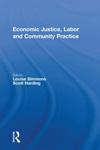 |
Harding, Scott and Louise Simmons, eds. Economic Justice, Labor and Community Practice. New York, NY: Routledge, 2009. |
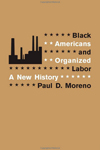 |
Moreno, Paul D. Black Americans and Organized Labor: A New History. Baton Rouge, LA: LSU Press, 2006. |
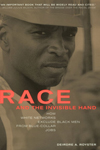 |
Royster, Deirdre A. Race and the Invisible Hand: How White Networks Exclude Black Men from Blue-Collar Jobs. Berkeley, CA: University of California Press, 2003. |
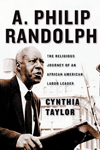 |
Taylor, Cynthia. A. Philip Randolph: The Religious Journey of an African American Labor Leader. New York, NY: NYU Press, 2005. |
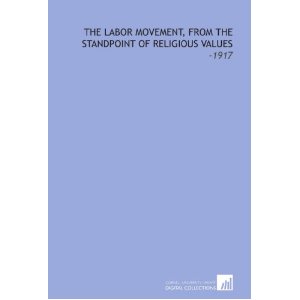 |
Ward, Harry Frederick. The Labor Movement from the Standpoint of Religious Values. New York, NY: Strugis & Walton Company, 1917. |
XII. Links to Helpful Websites for Celebration of Vocations
Disability Awareness Information: The African American Lectionary wants all churches to do a better job of including the disabled/differently abled. Please consider the following when planning, during all worship services, and all other church activities:
We need to give people with disabilities access to society’s most important place: our compassionate hearts. In fact, if we each begin with opening our hearts, access to our church buildings, programs and our lives will be a natural expression of welcoming all God’s children into the community of Christ’s body, freely and without prejudice. Our proactive inclusion of adults and children with disabilities into the full life of our churches then will become the living and best example of being like Christ.
XIII. Notes for Select Songs
A. Hymns(s)
- May the Work I’ve Done Speak for Me. By Sullivan Pugh. Arr. by K. Morris
Location:
The Consolers. Lord, Bring Me Down. 1969. Reissued in 1998. Mca Special Products, 1998.
- A Charge to Keep I Have. By Charles Wesley. African American spiritual
Location:
African American Heritage Hymnal. Chicago, IL: GIA Publications, 2001. #467
- I Don’t Feel Noways Tired. By James Cleveland
Location:
I Don’t Feel Noways Tired. Jackson, MS: 601 Records, 1981.
- Lead Me, Guide Me. By Doris M. Akers. Harm. by Richard Smallwood
Location:
African American Heritage Hymnal. #474
B. Well-Known Song(s)
- I’m Available to You. By Milton Bronson
Location:
Available to You. New York, NY: Word Records, 1988.
- Serving the Lord Will Pay Off after a While. Arr. by Jasper Williams Jr.
Location:
Williams, Jasper Jr. and the Salem Baptist Choir. Serving the Lord Will Pay Off after a While. Jackson, MS: Atlanta Int’l, 2008.
- Life Is Like a Mountain Railroad. By Charles A. Tindley
Location:
Walker, Albertina. He Keeps on Blessing Me. New York, NY: Zomba, 1993.
C. Spiritual(s)
- Ain’t Got Time to Die. Arr. by Hall Johnson
Location:
Online location: http://www.negrospirituals.com/news-song/ain_t_got_time_to_die.htm
- Don’t You Let Nobody Turn You Around. Traditional
Location:
Pilgrim Jubilee Singers. Don’t You Let Nobody Turn You Around. Jackson, MS: Malaco Records, 1996.
- We Shall Overcome. Traditional
Location:
African American Heritage Hymnal. #542
D. Modern Song(s) (Written between 2000–2011)
- Trust Me. Richard Smallwood
Location:
Smallwood, Richard and Vision. Promises. New York, NY: Verity, 2011.
- Jesus Will. By Joshua’s Troop
Location:
Joshua’s Troop. Indianapolis, IN: Tyscot, 2002.
- Monday’s Pain. By Leon Lewis and Brian Courtney Wilson
Location:
Wilson, Brian Courtney. Just Love. New York, NY: Music World Gospel, 2009.
E. Liturgical Dance Music
- Angels Watching over Me. Traditional
Location:
Bryant, Rodnie. Angels Watching over Me. Indianapolis, IN: Tyscot, 1995.
- God’s Got It All in Control. By Kirk Franklin
Location:
Mann, Tamela and Kurt Carr. Kingdom Come Original Soundtrack. Inglewood, CA: Gospocentric Records, 2001.
F. Song for the Period of Prayer
- Call Him Up. By Rick Grundy
Location:
Pringle, Keith. Nothing Too Hard for God. Franklin, TN: Platform Music Group, 2010.
- How Long Has It Been (Since You Prayed)? By Douglas Miller
Location:
The Early Years. Atlanta, GA: Air Gospel, 2000.
G. Sermonic Selection
- Come I’ll Give You Rest. By Mattie Moss Clark
Location:
That’s Christ: He Was Hung Up for My Hang Ups. Detroit, MI: Sounds of Gospel, 2006.
- My Purpose. By Latrice Pace
Location:
The Anointed Pace Sisters. My Purpose. Jackson, MS: Savoy, 1995.
H. Benediction Song
- Let Your Will Be Done. By Michael McKay
Location:
Jones, Paul. I Won’t Complain. South Yorkshire, UK: Pure Records, 1993.
- That’s When You Bless Me. By John Black and Tony Wilkins
Location:
Vaughn, Greg, Sonya Griffin, and LA Mass Choir. Peace Be Still. New York, NY: A&M, 1998.
Note
1. This may more engagingly connect with an audience as Horrible Bosses, a 2011 blockbuster film. However, the phrasing that I chose for this title is sensitive to black preachers’ tendency for semblances of alliteration.
|